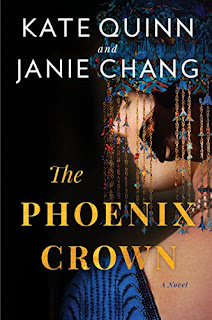Crossed Skis (1952) by Carol Carnac (Edith Caroline Rivett)
When a fire at a rooming house in Bloomsbury is put out, a grim discovery is made. The landlady thought the house was empty--all of her boarders were supposed to be gone for the New Year's holiday--but a body is found in the room of Mr. Gray. The fire did just enough damage that it's impossible to get an absolute identification, so they're not certain if it's Gray or if Gray has left someone else dead in his room. But the quick eyes of an officer left to guard the scene of the tragedy spots a clue that leads Inspector Julian Rivers and Detective Sergeant Lancing to a group of sixteen men and women on a skiing holiday in the Austrian Alps.
Bridget "Biddy" Manners had quite a time getting everything settled for the Austrian trip. With friends who found they couldn't get leave or needing emergency appendix surgery or just changing their minds, she finally got a roster set with several friends of friends as fill-ins--which meant that there were a few in the party no one knew anything about first hand. But the group gets to know one another as best they can on the train and boat trip over to the continent and things settle down quite nicely once they get to Austria. Everyone is getting on well and have eased into a familiarity that allows for gentle teasing--as if they had been friends for years. Until...
A few members of the group find some of their currency missing. Robert O'Hara (one of the friends of friends) is missing some Austrian money. Neville Heston (another substitute) is missing English currency. The English notes are found in a book amongst O'Hara's things and that results in a feeling of mistrust amongst the group. Kate Reid and Frank Harris, two of the most level-headed in the group, try to keep things calm while also making note of several discrepancies in certain members' behavior.
Meanwhile, Rivers and Lancing have found evidence that link the fire to a clever thief whose one mistake was losing a packet of cigarettes with his fingerprints on it. And that evidence seems to link up with one of the men in Biddy's skiing party. Now they're off to Austria to see if they can find the owner of the fingerprints. But as mentioned the man is clever and has chosen a place where it would be very easy to ski off into the sunset and be lost to all pursuers...will they be in time to get their man?
This is the first mystery I've read by Edith Caroline Rivett under the Carol Carnac name and my first introduction to Inspector Rivers. Rivers brings a bit more intuition and (as noted in the quote below) imagination to his detective work than Inspector MacDonald, her detective in the E. C. R. Lorac books. But his leaps of intuition and imagination are always followed by a gathering of evidence to support the theories. He and Lancing make a good team bouncing ideas off one another and keeping any flights of fancy in check. Kate Reid also makes a good semi-detective. Semi- because she doesn't really want to out anybody in their group, but she is a good observer and picks up on many of the discrepancies that point to the imposter in their midst. The clues are well-laid and I should have spotted the criminal, but wound up backing the wrong horse. Ah well, I don't mind being fooled when it's so nicely done.
Carnac also does a nice job with the Austrian setting. It's evident that details from her own skiing trip were fresh in her mind at the time of writing. The descriptions of the mountains, skiing trails, and surrounding farms make the reader feel as though they were there and thoughts of the bitter cold and heavy snowfall in the final pages help me forget about the heat and humidity outside (at least for a little while). ★★★★
First line: "By the Golden Arrow arch at Victoria Station, continental side, at twelve noon, tomorrow, New Year's Day, and don't be late," said Bridget Manners patiently.
Fancy bits. Fancy...imagination...guesswork. That's one way of looking at it. The other is to call it interpretation of unrelated details. Detection, in short.. It's one of the best imaginative efforts I've met in the detection line, Julian, because you've got the essentials--the bits of evidence which dovetail into a whole." (Charles, another Inspector in the CID; p. 181)
Lancing had bought six Penguin detective novels, from which he derived much entertainment: he left them all in the train at Langen--"as propaganda," he said to Rivers. (p. 210)
Last line: And Frank Harris found himself echoing the phrase "Crossed skis..."
***********************
Deaths = 2 (one in fire; one broken neck)









.jpg)
.jpg)
.jpg)

.jpg)

.jpg)
.jpg)
.webp)
.jpg)

.jpg)
























